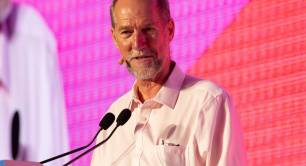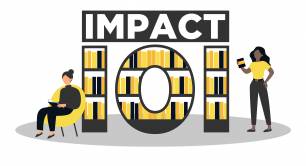Net hopeful: Impact funders plot the road to Net Zero at COP27
How can funders from across the continuum of capital help shift the dial to produce the trillions of dollars urgently needed for climate action? IVPC and Laudes Foundation convened a group of 70 philanthropic foundations, impact funds, family offices, banks, asset managers, and representatives from private equity and venture capital, on the sidelines of the COP27 meetings in Sharm el-Sheikh, Egypt, to explore the way forward. Allie Hollowell, COO of IVPC, says there are reasons to feel 'net hopeful'.
As we recover from the pandemic while striving for Net Zero it is more important than ever for global collaboration and catalytic finance to be leveraged for the transition to a green, resilient, and inclusive future. All forms of capital – from the philanthropic to the commercial – will need to work together to identify, enable and scale solutions that will allow for decarbonisation and development to go hand in hand, especially in the Global South. Global, regional and local stakeholders will need to drive this agenda collectively and platforms that bring these stakeholders together across geographies and asset classes are increasingly important.
It was with this backdrop that IVPC, in partnership with Laudes Foundation, convened a group of about 70 funders from across the continuum of capital on the sidelines of the COP27 meetings in Sharm el-Sheikh. What resulted was an insightful discussion on the gaps and opportunities for how these various forms of capital can come together and help us shift from billions to the trillions urgently needed for climate action. Below are my key takeaways from the stellar group of contributors who shared their insights and inspiration with us.
Who was in the room?
|
Implementation COP
Throughout my week at COP27, the phrase 'Implementation COP' was everywhere. This concept of shifting from pledges to action drove most sessions, and our gathering was no different.
Dr Dina Zayed, programme director, Climate Emergency Collaboration Group (CECG) said it best: “Pledges without delivery are just not good enough… $100 billion is the floor, not the ceiling. But despite that, we have failed time and time again to be able to meet those figures.”
Carl Brinton, managing director, strategy for the Rockefeller Foundation added that, in a recent report in partnership with BCG, they found that “only about 16% of the finance that's needed is currently flowing through public and private channels.”
Pledges without delivery are just not good enough… $100 billion is the floor, not the ceiling
Yuki Yasui, managing director, Asia Pacific Network, Glasgow Financial Alliance for Net Zero (GFANZ) went on to share how GFANZ, launched by former Bank of England Governor Mark Carney at COP26 to better engage financial institutions, was planning to help their members transition from pledges to action.
She said: “We believe that implementation of the net zero commitments of these 550 financial institutions (GFANZ members) should be focused on the real sectors, real economies transition to net zero. It sounds obvious, but a lot of the efforts made by the financial institutions so far has been actually on their finance emissions and not the impact that provides to the real economy.”
Philanthropy as a catalyst
Coming from my purview running a global family of social investment and venture philanthropy networks, many of my conversations at COP27 focused on the role of philanthropy in the climate finance agenda. There has not historically been a formal role for philanthropy at COP and this year in Egypt, we saw that beginning to shift with the launch of the UNFCCC Philanthropy Leadership Platform and the many announcements from philanthropies making additional commitments. And yet, still, less than 2% of global philanthropic funds are going towards climate action.
Leslie Johnston, CEO of Laudes Foundation and board chair of EVPA, opened our gathering with a challenge: “In order to cap global warming at 1.5 degrees, we need to increase climate finance by 590% to $4.35 trillion. Philanthropy is just under $1 trillion. So how can we as investors, both philanthropic and otherwise, use our funding to catalyze other funding?”
One of the barriers for philanthropists to getting involved in climate action is a lack of understanding about how they can play a role. Leslie’s reflections on the Laudes Foundation’s approach provide a helpful steer: “To unlock the finance we need, we have to change the rules of the system. We have to change the regulatory environment. We have to incentivise the private sector to step up and give them the tools to be able to do this. And we have to leverage the creativity and the leadership that comes with business and finance. Philanthropy plays an important role where we can de-risk and catalyze and maybe make it easier for the more commercial-minded amongst us to come in after that initial investment to show what could be possible.”
This sentiment was echoed by several others throughout the discussion. Rhian-Mari Thomas, CEO of the Green Finance Institute, said that while there are increasing opportunities to work with the public sector, especially “overseas development aid budgets, multilateral development banks and development finance institutions… the process of mobilising government taxpayers' money as part of structured solutions is just too slow.”
She added: “There is a critical role for philanthropic capital as venture philanthropy to nimbly demonstrate proof of concept, invest in the financial structures that genuinely enable private capital to move, and show the way for the government billions and the market trillions to follow.”
There is a critical role for venture philanthropy to... show the way for the government billions and the market trillions to follow
We saw a great convergence between these concepts of public and philanthropic capital coming together with an example given by Bruno Aranha, managing director of the Brazilian Development Bank, BNDES. “We need new financial instruments to catch these opportunities and these challenges. And also partnership,” he said. “We decided to launch several matching funds related to forest health, education, and innovation. BNDES committed itself to donating $1 for each dollar donated by the private sector to support these sustainable projects. In this regard, in only 18 months, we mobilised $500m in Brazil.”
Yuki Yasui took this one step further giving concrete examples of the managed phase-out of coal power generation in the Asia Pacific. She explained: “We don't really expect the philanthropic community to bear the cost of the managed phase-out, but where we think it would be really helpful for philanthropic capital to come in is on the replacement of coal with renewable energy to make sure that it's not just about phasing out but that there are new opportunities that provide access to affordable energy through that process.” She went on to say that philanthropy also has a role in “the just transition elements, making sure that the project is thinking about how it affects the community, how it affects the reskilling of jobs, and so on.”
Ensuring the just and equitable transition
Yuki’s comments bring us to the third main theme of our event – ensuring a just and equitable transition.
Carl Brinton provided deep insight into this topic: “This is a crisis, and it's a huge opportunity, and it is an opportunity that must be unlocked for the Global South,” he said. “If all of the benefits of the transition accrued to the Global North, we will have failed. So, how do we partner with people in the Global South to surface and scale solutions from the Global South?”
The Rockefeller Foundation is focusing on climate for development, he said, explaining: “It's not enough to just do climate. It's not enough to just do development.” As an example, he pointed to is the partnership with IVPC, the organisation I lead, reflecting on the convening of “public, private and philanthropic sector actors across 16 countries from five different continents, that launched The Global South Impact Community (GSIC), [now] taking forward a number of very interesting ideas and priorities surfaced from this group, among which was climate finance”.
Nazmeera Moola, chief sustainability officer of South Africa-based global investment manager Ninety One, shared her concern about the decarbonisation agenda taking investors away from investing in emerging markets: “One of the unintended consequences of a focus on portfolio decarbonisation is to take money out of emerging markets,” she said. “Part of that is because the developed market exported its carbon to emerging markets. Part of that is just emerging markets are further behind in economic development.” She stressed that “to catalyse the billions into trillions, we do need to catalyse more investors into emerging markets. Right now we are going in the opposite direction.”
Rhian-Mari Thomas pointed to the finance flows that blend public and private finance, reflecting that they “have totalled just over $160bn over the past decade, according to Convergence.” She also gave a nod to Yuki and GFANZ stating that the commitment from their 550 financial institutions “gives us an unprecedented opportunity to scale up these types of transactions whereby public or philanthropic capital is played as a concessionary investment.”
An urgent need to change global financial architectures and regulations
Steve Waygood, chief responsible investment officer at Aviva, painted a staggering picture of our potential future that the insurance industry is bracing for: “Climate change is an existential crisis for civilization and it hits insurance and then reinsurance first,” he said. “The extreme physical risk that [climate change] could manifest presents so much risk that it could collapse the business model of insurance.”
Putting that in context, he continued: “Just 8% of the US mortgage market caused the global financial crisis in 2008. Now imagine if all mortgage markets simultaneously are going into some kind of recession because of physical risk and climate change…” A bleak picture. Luckily, he didn’t stop there, but continued to his message of hope, pointing to the seemingly daunting figure of $3-4 trillion needed for the just transition, reminding us that “there's over 500 trillion in the global capital markets. So, civilization has enough money. We have enough solutions. What we lack is political will and a financial system that was designed to deal with the climate crisis.”
We have enough solutions. What we lack is political will and a financial system that was designed to deal with the climate crisis
The year 2024 will mark the 80th anniversary of the Bretton Woods agreement, which resulted in the birth of two key institutions, the IMF and the World Bank. Steve Waygood shared his ambition to use this milestone as a “catalyst to review the entire international financial architecture”. People came together for the Bretton Woods Conference in order to bring about greater political and economic stability, believing that the economic failures that arose following the First World War were a significant factor in bringing about World War II. “If we're going to stop a third one,” said Steve, “we now need to revisit the same institutions and we have an opportunity to do that.”
Carl Brinton echoed this sentiment, sharing an initiative that the Rockefeller Foundation had already embarked on: a “Global Economic Resilience team, looking to reform the Bretton Woods institutions in particular, to have a climate focus in addition to a development focus.”
Dr Zayed also remarked on this, referencing the statistics on public debt of developing countries which has “increased from 40% of their GDP to an average of 62%. Most climate finance, [approximately] 61%, was raised as debt, of which only 12% was concessional.” This would only be exacerbated, she said, with “the debt burden which countries are expected to take on as they seek funding to manage climate impacts and the respect of transitions”.
More funding needed for adaptation
Dr Zayed continued her impressive list of statistics pointing to the dearth of climate adaptation funding. “Currently, only 1.6% of all adaptation funding comes from the private sector, despite existing research, including from the Global Commission on Adaptation, that suggests there is a business case to be made for adaptation and adaptation measures. Investing in $1.8 trillion globally in climate adaptation measures for things like early warning systems or climate resilient infrastructure, in a period from 2020 to 2030, could generate $7.1 trillion in net benefits,” she said.
“So,” she concluded, “the solution isn't to tap private sector doors or philanthropic doors, but instead to be working coherently to ramp up ambition both in private, public and in multilateral spaces and banks.”
Carl Brinton agreed: “Adaptation and resilience is something that we can't put off to some future date. It's happening right now.”
These facts were not lost on the group who were acutely aware, with COP27 held on the continent that is least historically responsible for global emissions and currently responsible for less than 4% of emissions, yet locked in for 20 years of climate change impacts. The historic agreement on the Loss and Damages Fund is a start to addressing these injustices, but we have a long way to go.
I think throughout this session and all of the sessions at COP27, the quote that stuck with me most and best describes my first COP experience was from Andrew Steer, CEO of Bezos Earth Fund, who said: “We are in an intellectual battle between dread and hope and we need to hold them both closely.”
I hope that we all are holding onto both emotions as we convert conversations into action – and that we are all feeling 'Net Hopeful'.




